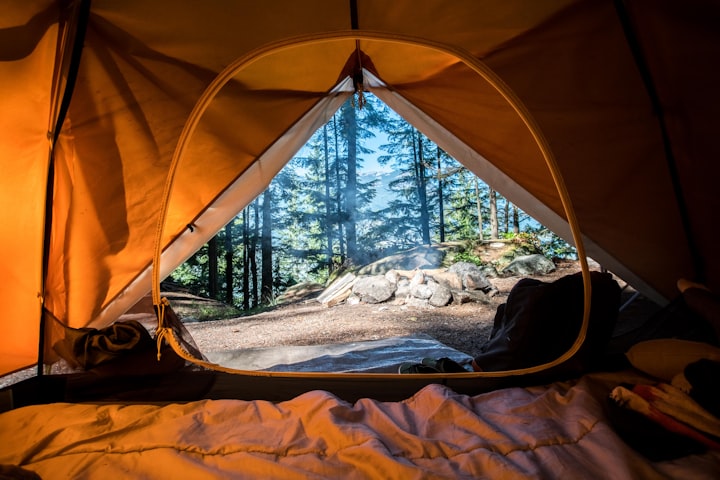10 Tips for Camping like a Pro
Read this article to learn more...

Are you ready to take the plunge into the world of camping? If so, you've come to the right place! Camping is a great way to enjoy the outdoors and create lasting memories with friends and family. But if you're a beginner, it can seem a bit daunting. Fortunately, there are plenty of tips and tricks to help you camp like a pro. In this blog post, we'll be exploring 10 tips to make your camping trip easier and more enjoyable. So, if you're ready to learn the basics of camping, let's get started!
1) Do your research
When planning your camping trip, it’s important to do your research before you head out into the wilderness. Take some time to look into the area that you’re planning on visiting and the terrain. Are there any local regulations you need to be aware of? Check for permits that may be necessary and make sure you know what type of wildlife is in the area. It’s also a good idea to check the weather forecast and plan accordingly. Knowing what to expect can help you pack the right gear and plan for the worst. If there is an emergency, knowing where the nearest hospital or other resources are can make a big difference.
2) Get the right gear
Having the right gear is essential for a successful camping trip, especially if you’re a beginner. The right camping gear can make your experience safer, more comfortable, and more enjoyable.
First, you’ll need a tent that is big enough to comfortably fit everyone in your party. Don’t forget to factor in space for gear, too. Second, consider sleeping bags that are rated for the temperature you’ll be camping in. Invest in a good quality pad or air mattress to put beneath your sleeping bag for added comfort and insulation.
Next, you’ll need a camp stove to cook food. Make sure to bring along plenty of fuel for cooking. Don’t forget utensils, pots and pans, and dishes for eating.
Also, be sure to bring along flashlights and/or headlamps for when it gets dark. And don’t forget bug repellent, sun protection, first aid supplies, and anything else you might need for your particular destination and activities.
Finally, don’t forget some comforts from home such as a pillow or small rug, to make your camping trip more enjoyable. With the right gear, you’ll be ready to enjoy your camping adventure like a pro!
3) Choose your campsite wisely
When it comes to camping, the right campsite can make or break your experience. When choosing a campsite, there are a few things to consider to ensure that you have the best possible experience.
First, consider the location and terrain of the campsite. Different sites offer different levels of difficulty and difficulty should be taken into account when picking a place to camp. For example, if you are a beginner, you may want to stick to sites with flat terrain or well-marked trails.
Also, consider the facilities that are available at the site. Some campsites may have running water, electricity, or even bathrooms and showers. Knowing what is available ahead of time can make sure that you have all the amenities you need for an enjoyable camping trip.
Finally, take into account any potential hazards at the site. Be sure to look for things like steep inclines, dense underbrush, and potential animal encounters. Knowing what potential dangers may exist at the campsite before you arrive can help you to stay safe while you are out in the wilderness.
Choosing the right campsite is an important part of the camping process. By taking the time to research and assess the site before you go, you can ensure that you have a great camping experience.
4) Be prepared for the weather
No matter where you are camping, it’s important to be prepared for the weather. The most important thing to do is to check the forecast before you leave and plan accordingly. Even if it is sunny when you arrive, storms can roll in quickly so be ready with a raincoat and other necessary clothing.
Bring layers of clothing in case the temperature changes unexpectedly. It’s also important to wear clothes that are designed to wick away moisture, as they will keep you warm and dry even in wet conditions. When packing for camping, you should always be mindful of how windy and rainy it might get, so bring along any appropriate gear you may need.
Also, consider the type of terrain you will be camping on. If it’s in an area that could become muddy or slippery, bring waterproof shoes and/or gaiters. Also, remember to bring a hat or headwear that is warm and comfortable, even if the weather is mild when you arrive. You never know what kind of temperature or weather changes you may face during your camping trip, so it’s best to be prepared.
5) Set up camp before it gets dark
One of the most important tips for camping is to set up camp before it gets dark. This can help you avoid any problems that might arise from trying to set up your tent or build a fire in the dark. Plus, it gives you the chance to familiarize yourself with your surroundings and settle into your new campsite before nightfall.
When setting up camp, make sure you have everything you need for the night, including food, water, and supplies. It’s also important to make sure your tent is staked securely and that your campsite is clear of any potential hazards like sharp sticks or rocks. If possible, try to choose a site that is close to a water source, as well as away from any busy roads or trails.
Once your tent is set up, you should start gathering materials for a fire if you plan on having one. Try to do this before the sun goes down so you can see what kind of wood is available and collect enough of it to last through the night. If there are any leftover materials, store them away safely in a dry place for use the next day.
By setting up camp before it gets dark, you can ensure that your camping experience is both safe and enjoyable. With the right preparation and a little bit of luck, you can make the most out of your camping trip!
6) Keep your food safe
When camping, keeping your food safe is important. Make sure that all of your food is stored properly and kept away from wildlife. Make sure to keep all food stored in a cool, dry place and keep it off the ground.
If you’re camping in bear country, use bear-proof containers or hang your food from a tree. In any case, make sure to always clean up after yourself and dispose of food scraps properly to avoid attracting unwanted pests or animals. If you’re going to be storing food in your tent, make sure to keep it sealed in airtight containers and never leave food lying around. It’s also important to make sure to check expiration dates on food items before packing them for your trip.
7) Be mindful of your impact
When camping, it is important to remember that we are guests of the environment and have a responsibility to leave the area better than we found it. It’s essential to practice Leave No Trace principles by packing out all your garbage, being mindful of fire safety, and avoiding disturbing wildlife. Avoiding walking on fragile vegetation, such as wildflowers and alpine meadows, is also important. Be sure to respect local rules and regulations when you are camping, such as campfire restrictions or leash requirements for dogs. Taking steps to reduce your environmental impact will ensure that our outdoor spaces remain beautiful for years to come.
8) Don't forget the fun
Camping is an opportunity to explore the great outdoors, unplug from technology, and reconnect with nature. But it's also an opportunity to relax, have fun, and make memories with your friends and family.
Whether you’re swimming in the lake, playing a game of horseshoes, or telling stories around the campfire, make sure you take time to savor the moment and enjoy yourself. Bring along games, books, cards, music, and other activities to help make the most out of your camping experience. Don't forget to bring a camera for capturing memories!
In addition to relaxing and playing games, take the time to explore your surroundings and get in touch with nature. Take a hike in the woods, look for wildlife, go fishing, or sit quietly and enjoy the scenery. No matter how you choose to spend your time, don't forget to have fun!
9) Be safe
When camping, safety is always the top priority. No matter where you go, you should be aware of your surroundings and take the necessary precautions to ensure a safe and enjoyable camping experience. Make sure you have a first aid kit and know how to use it. If you're hiking or exploring remote areas, bring along a map and compass and let someone know your plans. Always wear appropriate clothing for the terrain you’re in and watch out for any potential hazards like wild animals or poisonous plants. Finally, make sure to bring along enough water, snacks, and sunscreen. With these safety tips in mind, you can relax and enjoy your camping trip!
10) Have a plan B
No matter how well-prepared you are for your camping trip, it's always a good idea to have a plan B. That way, if something unexpected happens and your original plans fall through, you won't be completely stranded. Make sure you know the area you're camping in and have a backup plan if necessary. If the campsite isn't suitable, have a backup location nearby. Also, make sure you have a reliable way of getting home in case of an emergency. With a plan B in place, you can relax knowing that you have options in case anything goes wrong.
About the Creator
Yiannis Kapageridis
Making sense of the world, one post at a time. Sharing my thoughts and insights on all things life, love, and beyond.
Enjoyed the story? Support the Creator.
Subscribe for free to receive all their stories in your feed. You could also pledge your support or give them a one-off tip, letting them know you appreciate their work.






Comments
There are no comments for this story
Be the first to respond and start the conversation.